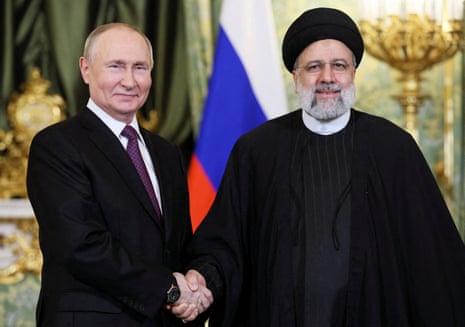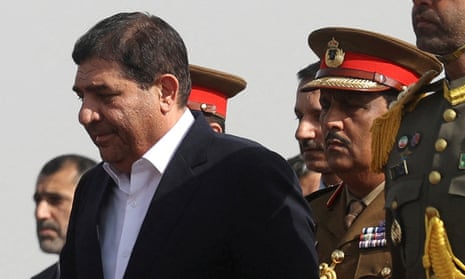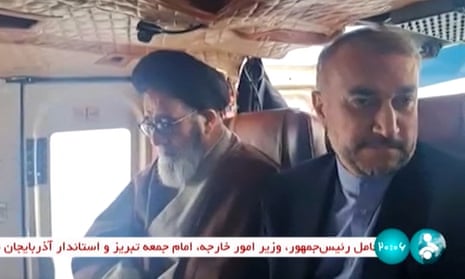Iranian state-run television is reporting that Iranian President Ebrahim Raisi has died in a helicopter crash alongside foreign minister Hossein Amir-Abdollahian.
The pair were confirmed dead after the crash in a mountainous area in the province of East Azerbaijan, Press TV reported, without citing a source. The report follows similar reports from other Iranian media including the Mehr and Tasnim news agencies as well as the Reuters news agency.
No immediate cause was given for the crash, which took place amid foggy conditions on Sunday as the president was returning from a trip to neighbouring Azerbaijan to inaugurate a dam.
The governor of Iran’s East Azerbaijan province and the representative of the Leader of the Islamic Revolution to East Azarbaijan province as well as bodyguards were also on board, the state-run Irna news agency reported.

Reuters is reporting that an Israeli official has told the news agency it was not involved in the helicopter crash which has killed Iran’s president Ebrahim Raisi.
Israel rarely officially comments on its activities outside its border, which in recent months have included strikes inside Lebanon, Syria and Iran.
In April Iran launched an unprecedented direct attack on Israel, authorised by Raisi, which it said was in retaliation for what it considered to be an Israeli strike on an Iranian diplomatic building in the Syrian capital, Damascus, on 1 April that killed a senior figure in Iran’s Islamic Revolutionary Guards and eight other officers.
Russian foreign minister Sergei Lavrov has said Iran’s president Ebrahim Raisi had been a “true, reliable friend” of Russia, Reuters reports.
It quotes Lavrov saying:
In Russia, the president of Iran Ebrahim Raisi and the minister of foreign affairs of Iran Hossein Amir-Abdollahian were known as true, reliable friends of our country. Their role in strengthening mutually beneficial Russian-Iranian cooperation and trusting partnership is invaluable. We sincerely extend our condolences to the families and friends of the victims, as well as to the entire friendly people of Iran. Our thoughts and hearts are with you in this sad hour.

While the president of the European Council has offered “sincere condolences” to Iran on the death of Ebrahim Raisi [See 7.39 BST], by contrast Dutch far-right politician Geert Wilders posted on social media this morning that “I hope Iran will soon become a secular state again, with freedom for the Iranian people, and without an oppressive and barbaric Islamic mullah regime.”
Hamas has issued a statement thanking Iran’s president Ebrahim Raisi and foreign minister Hossein Amir-Abdollahian for their support in its war against Israel after their deaths yesterday. Reuters reports the group said:
These leaders supported the legitimate struggle of our people against the Zionist entity, provided valued support to the Palestinian resistance, and made tireless efforts in solidarity and support in all forums and fields for our people in the steadfast Gaza Strip. They also made significant political and diplomatic efforts to stop the Zionist aggression against our Palestinian people.
The European Council president, Charles Michel, said this morning that “the EU expresses its sincere condolences for the death of president Ebrahim Raisi and foreign minister Hossein Amir-Abdollahian, as well as other members of their delegation and crew in a helicopter accident.”
“Our thoughts go to the families,” he added.
Russia’s embassy in Tehran on Monday has also expressed condolences over the death of Iranian president Ebrahim Raisi, who was killed in a crash after his helicopter went down in mountains close to Iran’s border with Azerbaijan yesterday. As president, Raisi supplied Russia with arms for use in its invasion of Ukraine.

Mohammed bin Zayed Al Nahyan, president of the UAE, has said his country stands in solidarity with Iran at what he described as a “difficult time”, and extended condolences to the Iranian government and the people of Iran, Reuters reports.
Vice-president Mohammad Mokhber has led an emergency cabinet meeting following news of the death of President Raisi in a helicopter crash, state media is reporting.
In a statement, the government extended its condolences to Supreme Leader Ali Khamenei and the Iranian nation and said it would continue to operate “without disruption”, according to Press TV.
Ministers also paid tribute to the late president and his “tireless efforts”, according to the Tasnim news agency.
As Iran’s vice president, Mohammad Mokhber is expected to become the country’s interim president who will help organise a presidential election that should take place within 50 days of the president’s death.
Here’s what to know about him according to Reuters:
Born on 1 September 1955, Mokhber, like Raisi, is seen as close to Supreme Leader Ali Khamenei, who has the last say in all matters of state. Mokhber became first vice president in 2021 when Raisi was elected president.
Mokhber was part of a team of Iranian officials who visited Moscow in October and agreed to supply surface-to-surface missiles and more drones to Russia’s military, sources told Reuters at the time. The team also included two senior officials from Iran‘s Revolutionary Guards and an official from the Supreme National Security Council.
Mokhber had previously been head of Setad, an investment fund linked to the supreme leader.
In 2010, the European Union included Mokhber on a list of individuals and entities it was sanctioning for alleged involvement in “nuclear or ballistic missile activities”. Two years later, it removed him from the list.
In 2013, the US Treasury Department added Setad and 37 companies it oversaw to a list of sanctioned entities.
Setad, whose full name is Setad Ejraiye Farmane Hazrate Emam, or the Headquarters for Executing the Order of the Imam, was set up under an order issued by the founder of the Islamic Republic, Khamenei’s predecessor, Ayatollah Ruhollah Khomeini. It ordered aides to sell and manage properties supposedly abandoned in the chaotic years after the 1979 Islamic Revolution and channel the bulk of the proceeds to charity.

Iran’s Tasnim news agency has a few more details about the other people on board the helicopter when it crashed; there were nine people in total.
According to Tasnim, they included East Azerbaijan governor Malek Rahmati and Maj Gen Seyed Mehdi Mousavi, head of the president’s security team. A pilot, co-pilot and a technician were also on board.
If you’re just joining us, here is a summary of the latest developments in Iran, where it’s just gone 9am.
Iranian state-run media have confirmed the death of President Ebrahim Raisi and foreign minister Hossein Amir-Abdollahian in a helicopter crash in the province of East Azerbaijan on Sunday as they headed towards the city of Tabriz. “The servant of Iranian nation, Ayatollah Ebrahim Raisi has achieved the highest level of martyrdom whilst serving the people,” state television said.
The pair were returning from Azerbaijan, where they had attended the inauguration of a dam alongside President Ilham Aliyev, when the helicopter crashed in a mountainous region amid poor weather conditions.
The government has yet to make an official statement but the state-run news agency Irna reported that an urgent cabinet meeting had been called and a statement was expected soon.
After an hours-long search hampered by fog and rain, rescuers found the burnt-out wreckage of the helicopter on a mountainside. The head of the Iranian Red Crescent, Pir Hossein Kolivand, said as rescuers approached the wreckage, that there were “no signs of life”.
A total of nine people were on board the aircraft, according to Tasnim news agency, including the governor of East Azerbaijan, Malek Rahmati, and Ayatollah Mohammad Ali Ale-Hashem, the representative of the Leader of the Islamic Revolution to East Azarbaijan province.
On Sunday, before the wreckage had been found, supreme leader Ayatollah Ali Khamenei urged Iranians to “not worry” about the leadership of the Islamic republic, saying “there will be no disruption in the country’s work”.
The president is believed to have been travelling in Bell 212 helicopter. Iran flies a variety of helicopters in the country, but international sanctions make it difficult to obtain parts for them. Its military air fleet also largely dates back to before the 1979 Islamic Revolution.
If a president dies in office, article 131 of the Islamic Republic’s constitution says that the first vice president – in this case Mohammad Mokhber – takes over, with the confirmation of the supreme leader, who has the final say in all matters of state in Iran. A council consisting of the first vice president, the speaker of parliament and the head of the judiciary must arrange an election for a new president within a maximum period of 50 days.
Countries including Russia, Turkey and India had expressed concern and offered assistance after reports that the helicopter carrying Raisi had gone missing and after his death was confirmed expressions of condolence also began to come in.
Indian prime minister Narendra Modi said on X that he is “shocked by his tragic demise” and that his “contribution to strengthening India-Iran bilateral relationship will always be remembered.
Before news of Raisi’s death a US state department spokesperson said only that, “We are closely following reports of a possible hard landing of a helicopter in Iran carrying the Iranian president and foreign minister”. US President Joe Biden had been briefed on the situation, his spokesperson said.
If a president dies in office, article 131 of the Islamic Republic’s constitution says that the first vice president – who is Mohammad Mokhber – takes over, with the confirmation of the supreme leader, who has the final say in all matters of state in Iran.
A council consisting of the first vice president, the speaker of parliament and the head of the judiciary must arrange an election for a new president within a maximum period of 50 days, Reuters reports.
Raisi was elected president in 2021 and, under the usual timetable, a presidential election had been due to take place in 2025. Under constitutional rules, it can now be expected to take place by early July.
Indian prime minister Narendra Modi has extended his condolences to President Raisi’s family and the Iranian people, saying in a post on X that he is “shocked by his tragic demise”.
Iran’s foreign minister, Hossein Amirabdollahian, was a hard-liner close to the country’s paramilitary Revolutionary Guard who confronted the west while also overseeing indirect talks with the US over the country’s nuclear program. The Associated Press reports further:
Amir-Abdollahian represented the hard-line shift in Iran after the collapse of Tehran’s nuclear deal with world powers after then-US President Donald Trump unilaterally withdrew America from the accord. He served under President Ebrahim Raisi, a protégé of Supreme Leader Ayatollah Ali Khamenei, and followed their policies.
However, AmirAbdollahian also was involved in efforts to reach a détente with regional rival Saudi Arabia in 2023, a move eclipsed months later by tensions that arose over the Israel-Hamas war. But he remained close to the country’s paramilitary Revolutionary Guard, once praising the late Gen. Qassem Soleimani, slain in a US drone strike in Baghdad in 2020.
“You should thank the Islamic Republic and Qassem Soleimani because Soleimani has contributed to world peace and security,” Amir-Abdollahian once said. “If there was no Islamic Republic, your metro stations and gathering centres in Brussels, London and Paris would not be safe.”
Amir-Abdollahian served in the foreign ministry under Ali Akbar Salehi in 2011 through 2013. He then returned for several years under foreign minister Mohammad Javad Zarif, who was a key player in the nuclear deal reached under the administration of the relative moderate President Hassan Rouhani.
But Zarif and Amir-Abdollahian had a falling out, likely over internal differences in Iran’s foreign policy. Zarif offered him the ambassadorship to Oman, still a strategically important post given the sultanate long serving as an interlocutor between Iran and the west. But Amir-Abdollahian refused.
He became foreign minister under Raisi with his election in 2021. He backed the Iranian government position, even as mass protests swept the country in 2022 after the death of Mahsa Amini, a woman who had been earlier detained over allegedly not wearing a hijab, or headscarf, to the liking of authorities. The months-long security crackdown that followed the demonstrations killed more than 500 people and saw over 22,000 detained.
In March, a United Nations investigative panel found that Iran was responsible for the “physical violence” that led to Amini’s death.
During the Israel-Hamas war, he met with foreign officials and the leader of Hamas. He also threatened retaliation against Israel and praised an April attack on Israel. He also oversaw Iran’s response to a brief exchange of airstrikes with Iran‘s nuclear-armed neighbor Pakistan and worked on diplomacy with the Taliban in Afghanistan, with whom Iran had tense relations.

Iranian state television has released this screen grab from video footage from inside the helicopter before it crashed. It shows President Ebrahim Raisi (L) with foreign minister Hossein Amir-Abdollahian.

https://news.google.com/rss/articles/CBMipgFodHRwczovL3d3dy50aGVndWFyZGlhbi5jb20vd29ybGQvbGl2ZS8yMDI0L21heS8yMC9pcmFuLWhlbGljb3B0ZXItY3Jhc2gtbGl2ZS11cGRhdGVzLWVicmFoaW0tcmFpc2ktaXJhbmlhbi1wcmVzaWRlbnQtc2VhcmNoLWFuZC1yZXNjdWUtbWlkZGxlLWVhc3QtY3Jpc2lzLWxhdGVzdC1uZXdz0gEA?oc=5
2024-05-20 06:55:05Z
CBMipgFodHRwczovL3d3dy50aGVndWFyZGlhbi5jb20vd29ybGQvbGl2ZS8yMDI0L21heS8yMC9pcmFuLWhlbGljb3B0ZXItY3Jhc2gtbGl2ZS11cGRhdGVzLWVicmFoaW0tcmFpc2ktaXJhbmlhbi1wcmVzaWRlbnQtc2VhcmNoLWFuZC1yZXNjdWUtbWlkZGxlLWVhc3QtY3Jpc2lzLWxhdGVzdC1uZXdz0gEA
Tidak ada komentar:
Posting Komentar